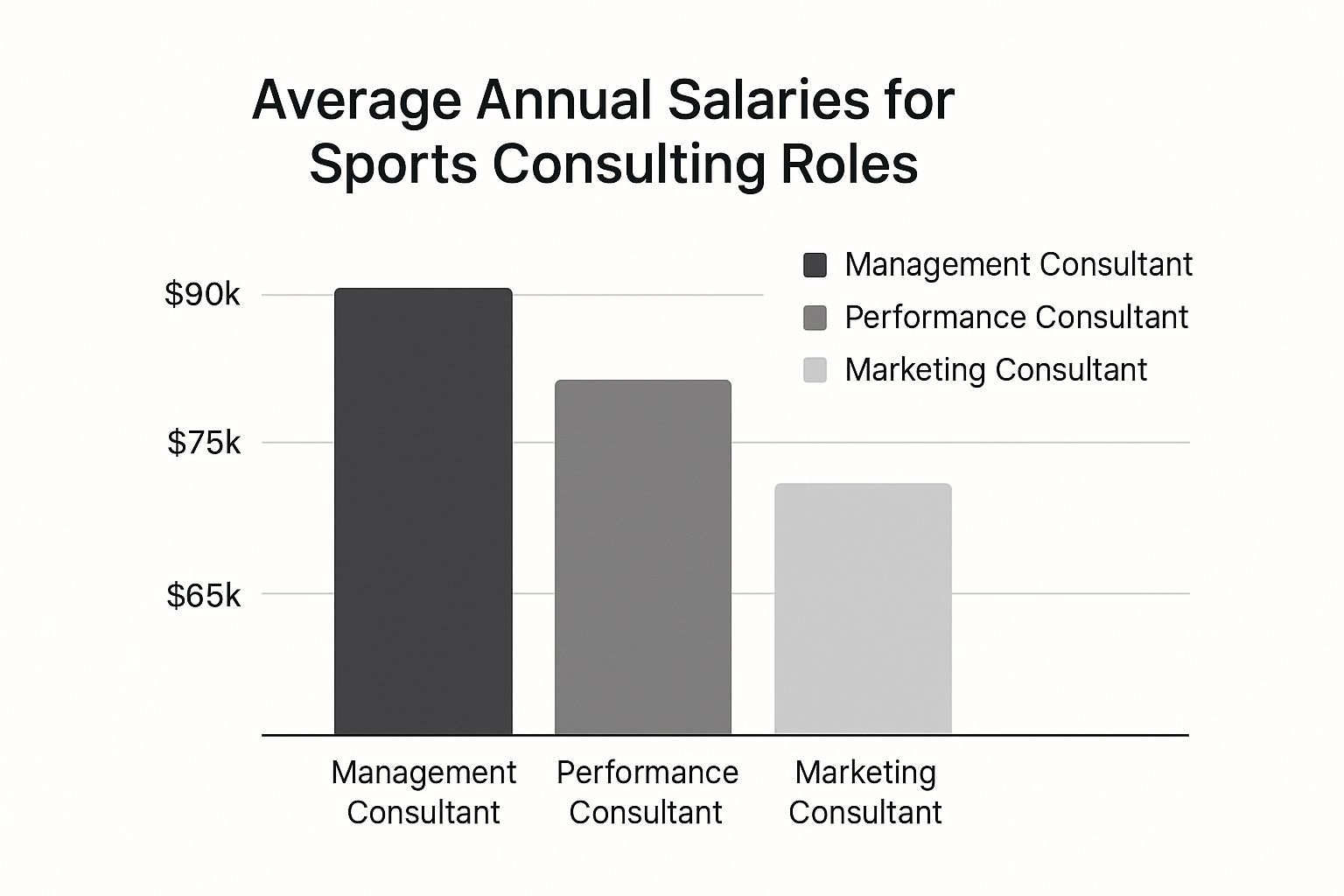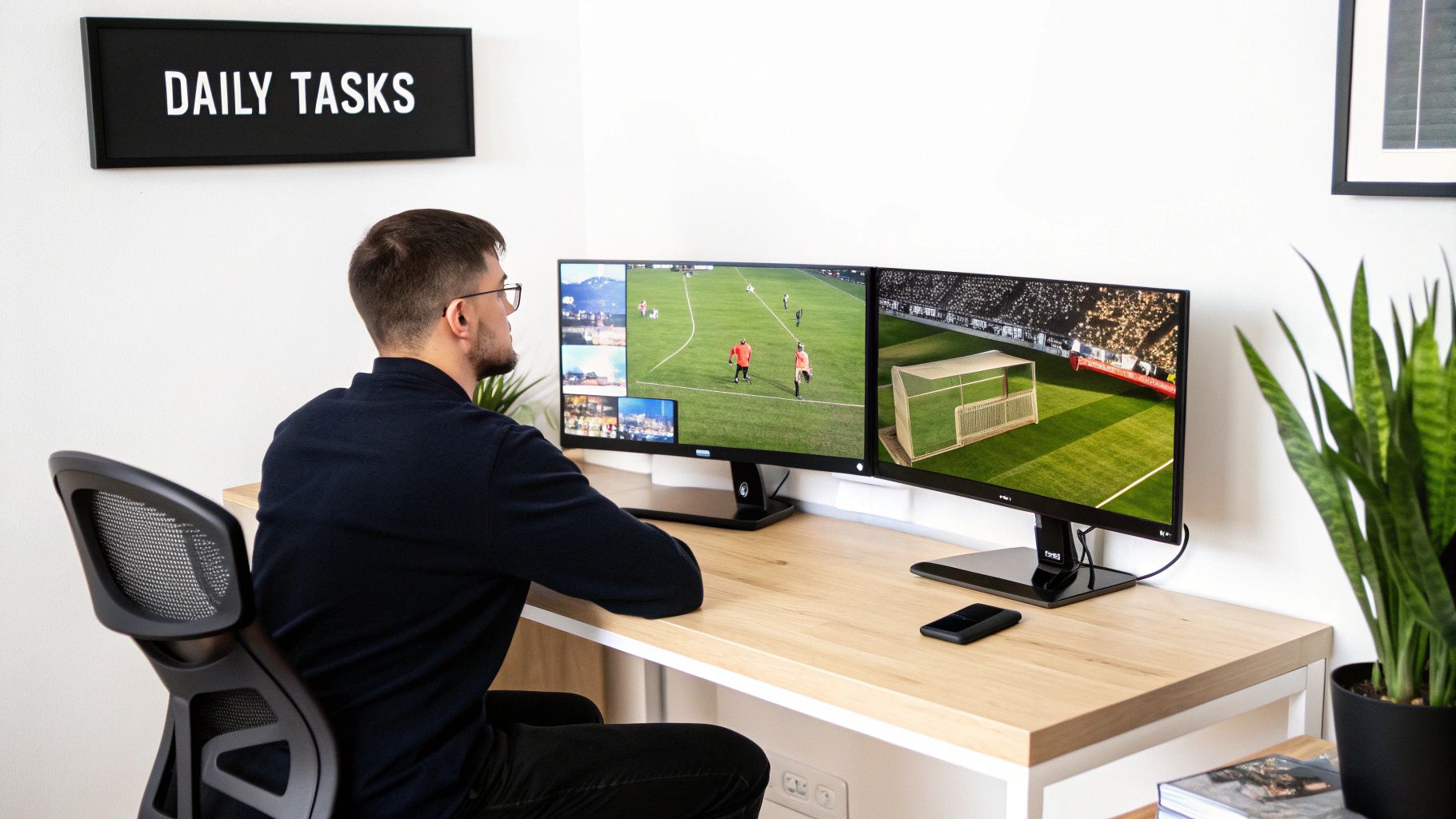
How to Land Sports Consulting Jobs Today
Forget what you might see in a generic job description. A career in sports consulting isn't just about loving sports, it’s about being the strategic brain behind the teams, leagues, and brands that define the industry. We’re the problem-solvers working in the background, tackling the complex business challenges that others are too busy to see.
This isn't a role where you just give opinions. It’s about delivering real, data-driven solutions. One day, you might be figuring out how to optimize stadium operations for a major league franchise. The next, you could be developing a market-entry strategy for a global apparel brand looking to sponsor a new league, or using advanced analytics to fine-tune a team's ticket prices to maximize revenue.
Why Is This Field Booming?
The demand for sharp sports consultants is surging, and it’s not by accident. It's being pushed by massive economic and technological shifts. Media rights deals are exploding in value, and using data analytics is no longer optional, it's essential for any organization that wants to stay competitive.
This creates a perfect environment for experts who can turn complex data into a clear, strategic roadmap.
The numbers back this up. The global sports consulting market, currently valued at USD 8.79 billion, is expected to hit USD 10.64 billion in the next year. Projections show the market soaring to nearly USD 49 billion by 2033, growing at a blistering pace of 21.02% annually. This massive expansion is a direct result of the growing need for specialized expertise in areas like performance analysis, sports marketing, and operational strategy. You can dig into more of the data on this incredible market growth from Business Research Insights.
To give you a clearer picture, I've broken down the main service areas you'll find in sports consulting. These are the core domains where consultants make their mark.
Key Sports Consulting Service Areas and Their Focus
| Service Area | Core Focus | Typical Clients |
|---|---|---|
| Strategy & Operations | Improving efficiency, revenue growth, and fan engagement. | Teams, Leagues, Venue Operators |
| Financial Advisory | M&A, valuations, and major capital project assessments. | Investors, Team Owners, Municipalities |
| Performance Analytics | Using data for player evaluation, recruitment, and on-field strategy. | Front Offices, Coaching Staffs |
| Marketing & Sponsorship | Maximizing brand value, media rights, and partnership deals. | Brands, Leagues, Player Agencies |
| Digital & Technology | Implementing tech solutions for fan experience and data management. | Teams, Media Companies |
Essentially, each area requires a unique blend of business acumen and a deep understanding of the sports world's specific dynamics.
Your Day-to-Day Impact
So, what does this actually look like on the ground? The work is incredibly varied, but the impact is always tangible. Consultants aren't just advisors; we’re catalysts for change.
- Strategic Planning: Helping a pro sports league figure out if expanding into new cities makes financial and logistical sense.
- Operational Improvement: Diving into a stadium's concession sales data to redesign layouts and staffing, leading to shorter lines and more profit.
- Financial Advisory: Building the financial models to see if a massive stadium renovation project will actually pay off in the long run.
- Performance Analytics: Working side-by-side with a team’s front office to invent new metrics for spotting undervalued talent in the draft.
The real magic of a sports consultant is bringing an objective, analytical eye to problems that organizations are often too close to see clearly. We're the ones who connect the dots between what happens on the field and what happens on the balance sheet.
The chart below gives you a sense of the average salaries for common entry points into sports consulting.

As you can see, roles in management consulting tend to start with the highest salaries. That's a direct reflection of the high-level strategic work and the immense value these positions bring to an organization.
Building the Right Skillset for a Consulting Career

Getting one of the top sports consulting jobs takes more than just being a die-hard fan with a business degree. The big firms are hunting for people with a very specific, high-value toolkit. Forget thinking of it as a simple checklist. You need to build an arsenal of analytical weapons and communication skills that can actually solve tricky business problems.
A background in business, finance, or sports management is a great starting point, no doubt. But what really sets you apart is your ability to apply specialized skills to the unique challenges of the sports world. It’s all about building that bridge between raw data and a winning strategy.
The Essential Hard Skills
Hard skills are your bread and butter, the technical, measurable abilities that form the foundation of any good consultant's work. These are the tools you'll use day-in and day-out to dissect problems, spot opportunities, and build a rock-solid business case for your recommendations. In sports consulting, a few are absolutely non-negotiable.
Financial Modeling: You have to be able to build financial models from the ground up. This is critical for evaluating everything from a potential team acquisition to the ROI on a new stadium. It means you’re comfortable forecasting revenue, projecting costs, and running sensitivity analyses to flag potential risks.
Data Analysis and Visualization: You must be comfortable with data. Of course, this includes a deep knowledge of Excel, but more and more, firms want to see skills in SQL for pulling data and visualization software like Tableau or Power BI. The goal isn't just to find the numbers; it's to present them in a way that tells a clear, convincing story.
Market Research and Strategic Analysis: Consultants are paid to get up to speed on a new market, fast. This means digging deep into fan demographics, competitor strategies, and industry trends to inform frameworks like SWOT analysis or Porter's Five Forces.
Think of these skills as your ticket to the game. Without them, it’s almost impossible to give the kind of rigorous, evidence-based advice that clients are paying for.
The best consultants don’t just report on what happened yesterday; they use data to predict what will happen tomorrow. They can take a team’s ticketing data, for example, and build a dynamic pricing model that boosts revenue by 10-15% without ticking off the fanbase.
Mastering the Crucial Soft Skills
While your hard skills might land you the interview, it’s your soft skills that will make you a star. These are the interpersonal abilities that dictate how well you work with clients, manage projects, and persuade senior decision-makers. They’re tougher to quantify, but they're just as critical for success in this field.
Persuasive communication, for instance, is everything. You could build the most brilliant financial model known to man, but if you can't explain what it means to a team owner who isn’t a finance guru, your work is basically useless. It’s about translating complex analysis into a compelling story that makes people want to take action.
Building real relationships with clients is another one. Clients need to trust you, not just as an analyst, but as a genuine partner. This means actively listening, showing empathy for their challenges, and being straight with them about expectations all the way through a project.
Comparing Hard vs. Soft Skills in Action
| Scenario | Hard Skill Application | Soft Skill Application |
|---|---|---|
| New Sponsorship Deal | Analyzing market data to value the sponsorship package and project its potential ROI. | Presenting the findings to the sponsor, building rapport, and negotiating terms that benefit both parties. |
| Improving Fan Engagement | Using SQL to query fan behavior data and identifying key segments for targeted marketing. | Leading a workshop with the team's marketing department to brainstorm creative campaigns based on the data. |
| Stadium Renovation | Creating a complex financial model to assess the project's long-term financial viability. | Communicating the project's risks and rewards to stakeholders, including community leaders and investors. |
At the end of the day, a top sports consultant is the "complete package", a sharp analyst who is also an influential communicator. To get more insights on building your career, you can explore the advice on our sports industry blog, which is packed with resources for aspiring pros. Developing this dual expertise is the fastest way to stand out in a competitive field.
Crafting a Resume and Portfolio That Actually Gets Noticed

Let's be real. When you're applying for sports consulting jobs, your resume and portfolio aren't just documents; they're your opening pitch. They have to do more than just list what you did. They need to scream that you can solve tough problems and deliver real results for clients in the sports world.
Hiring managers at the big firms spend only a few seconds on each resume. You have to grab their attention instantly. The trick is to show them you already think like a consultant, no matter what your previous job titles were.
Reframe Your Experience for Impact
This is the biggest mistake I see people make: they describe their responsibilities instead of showcasing their achievements. A consulting resume is all about quantifiable impact. Your mission is to turn every single thing you've done, an internship, a class project, even a non-sports job, into a story about results.
For example, don't just say you "managed social media." What did that actually accomplish? Did you boost follower engagement by 20%? Did a content campaign you ran lead to a 15% jump in website traffic? Those numbers are what sell you. They speak way louder than a generic job description.
This shift in mindset is everything. You’re not just an intern or a recent grad. You’re a problem-solver who creates value.
Every bullet point on your resume needs to answer the one question every recruiter is thinking: "Can this person make our clients more money or more successful?"
Use the STAR Method to Quantify Your Wins
The STAR method is a fantastic way to structure your bullet points to focus on results. It’s an acronym for Situation, Task, Action, and Result. This framework forces you to connect what you did to a meaningful outcome, which is exactly how consultants communicate.
Let's break it down. A generic bullet point might say:
- Managed a project analyzing fan engagement data.
Boring, right? Now, let's inject some STAR power into it:
- Situation: A minor league team was watching attendance numbers drop.
- Task: My team had to dig into their fan data to find ways to reverse the trend.
- Action: I took the lead on analyzing survey and ticket data, pinpointed three underserved fan groups, and built a targeted digital marketing proposal.
- Result: The campaign we proposed was projected to grow the target audience by 15% and boost ticket sales by 10% the next season.
Now your new, powerful bullet point looks like this:
"Led a team to analyze fan engagement data for a minor league team, identifying three key growth opportunities that resulted in a proposed digital campaign projected to grow audience by 15%."
See the difference? That’s the kind of detail that gets you a callback.
Build a Portfolio to Prove You Can Do the Job
A portfolio is your secret weapon, especially if you're light on direct consulting experience. It's how you proactively show off the analytical and strategic thinking that firms are dying to find. Don't wait for someone to give you a project, create your own.
Pick a real-world sports business problem that actually interests you. Maybe you analyze a struggling team's ticket pricing or a league's plan to expand internationally.
Here’s a simple way to structure a case study you create yourself:
- Define the Problem: Clearly state the challenge. For example: The WNBA's New York Liberty wants to capture a larger share of the local market from other NYC sports teams.
- Do Your Analysis: Use public data, news articles, and financial reports to research the situation. You could even do a simple SWOT analysis or build a basic financial projection.
- Develop Recommendations: Based on what you found, propose 2-3 clear, actionable recommendations.
- Outline the Potential Impact: Put a number on it. For example: A targeted partnership with local youth basketball leagues could increase family ticket package sales by an estimated 25%.
Put two or three of these case studies into a clean PDF or a simple personal website. This portfolio becomes hard proof that you can think critically and strategically about the business of sports. When you mention it in your cover letter or interview, you immediately jump ahead of all the other candidates who only brought a resume.
How to Network Your Way into the Sports Industry
The sports industry can feel like a closed-off club, but strategic networking is the master key. I’m not talking about the old advice of just grabbing business cards at a conference. Real success, especially in landing sports consulting jobs, comes from building genuine, lasting connections. It's a mindset shift from "what can you do for me?" to "how can we help each other?"
And believe me, this approach has never been more critical. The global sports consulting market is on track to hit around $10 billion next year and is growing at a healthy clip of about 8% annually through 2033. You can dig into the specifics in this detailed market report. This boom is fueled by everything from skyrocketing media rights deals to a desperate need for sharp analytics.
Firms are constantly on the lookout for fresh talent, but the best roles are almost always filled through trusted recommendations. Your goal is to turn a casual contact into an advocate, someone who thinks of you the second an opportunity pops up.
Start with Digital Diligence
Your networking starts long before you ever shake a hand. Think of digital platforms as your personal scouting department. LinkedIn is the obvious first stop, but you have to use it like a consultant would: with precision. Blindly firing off connection requests is a waste of everyone's time.
Instead, get smart with the search filters. Find alumni from your university who are working at the firms you're targeting. That shared background is an instant warm-up for your first message.
But don't stop at LinkedIn. You need to go where the real conversations are happening. I've found incredible value in niche online communities, think subreddits like r/sportsanalytics, specialized Slack channels, or industry forums. When you jump into these discussions, ask smart questions, and offer thoughtful comments, you start to look less like a job seeker and more like a peer.
Perfect Your Outreach Message
Once you’ve found the right people, that first message is everything. It has to be short, respectful, and, most importantly, about them. A bad message is generic and immediately asks for a job. A great one shows you’ve put in the work.
Here’s a template I've seen work wonders for reaching out to an alum on LinkedIn:
"Hi [Name], I'm a fellow [Your University] alum and have been following your career path at [Consulting Firm] with great interest. I was particularly impressed by the work your team did on the [Specific Project, e.g., stadium renovation or new league launch]. I'm passionate about breaking into sports consulting and would be grateful for just 15 minutes of your time to hear about your experience and any advice you might have for someone starting out. Thank you for considering."
Why does this work?
- It's specific: It proves you’ve done your homework by mentioning a real project.
- It’s respectful: It asks for a defined, brief amount of their time.
- It’s value-oriented: You're asking for advice, not demanding a referral.
Turn Conversations into Opportunities
The informational interview is your time to shine. Whether it’s a quick 15-minute coffee or a video call, your main goal is to learn, not to pitch. I always tell people to prepare open-ended questions that you can't just find on the company's "About Us" page.
Questions to Ask in an Informational Interview
- What does a typical project look like in your role?
- What skills have been most critical to your success at the firm?
- How has the firm's approach to data analytics evolved in recent years?
- What is the biggest challenge your clients are facing right now?
Listen more than you talk. Seriously. And at the end of the chat, always ask this question: "Is there anyone else you think I should connect with?" It's a powerhouse for organically growing your network through warm introductions. Follow up with a thank-you note within 24 hours, and mention something specific you talked about to stick in their mind.
Building these relationships is a long game, but it's the most reliable path to landing those high-demand sports consulting jobs. To stay one step ahead, you should also create a profile and set up job alerts. That way, when a role finally opens up, you're ready to make your move.
Winning the Sports Consulting Interview

The interview process for a sports consulting gig isn't just a chat; it's a performance. You have to walk in ready to show them not just what you know, but how you think.
From that first screening call with a recruiter to the final, high-stakes meeting with the partners, every single step is designed to test a different part of your consulting toolkit.
Your success will hinge almost entirely on your preparation. While you'll definitely face behavioral questions, the real heart of the process is the case interview. This is where you prove you have the analytical horsepower and structured thinking to tackle real business problems under pressure. It's the ultimate test for anyone serious about this career.
Deconstructing the Case Interview
Think of the case interview as a live-action business problem. You're given a scenario and expected to solve it right there in front of the interviewer. The goal is to see if you can break down a messy issue, ask smart questions, handle data, and present a logical, confident recommendation. And in this field, you can bet the cases will be all about sports.
A hiring manager won't just ask about your favorite team. They'll hit you with something like this:
"A major European football club is struggling to grow its fanbase in North America. They have a limited budget but big ambitions. What's your recommendation?"
Panic is not a strategy. The key is having a framework, a mental model to attack the problem step-by-step. They aren't looking for a single "right" answer; they're evaluating your thought process.
Here’s a way to approach it:
Clarify and Scope: Don't jump to conclusions. Start by asking intelligent questions. What does "grow the fanbase" actually mean, merchandise sales, TV ratings, social media engagement? What’s the exact budget? Who are their main rivals in the North American market? This shows you're methodical.
Structure Your Approach: Tell the interviewer how you're going to solve it. For example: "Okay, first, I'd want to understand the current market for European soccer in North America. Second, I'll analyze the club's brand and how it's perceived. Third, I'll explore a few potential growth strategies, and finally, I'll recommend a path forward with some key success metrics."
Analyze and Brainstorm: Now you dig in. You could brainstorm different angles: grassroots marketing, partnering with youth soccer leagues, a targeted digital content strategy, or even collaborations with American sports influencers.
Conclude with a Recommendation: Pull all your analysis together into a clear, confident conclusion. Something like: "Based on the market and the tight budget, I’d recommend a digital-first strategy targeting urban millennials in key cities, backed by a pilot partnership with one Major League Soccer team to build credibility."
Preparing for Behavioral Questions
While the case interview tests your analytical chops, behavioral questions are all about your past experiences and soft skills. The interviewer wants proof that you can lead, work in a team, and solve problems. You need to come armed with compelling, concise stories, ideally using the STAR method we covered.
Be ready for the classics:
- "Tell me about a time you worked on a difficult team."
- "Describe a situation where you had to persuade a senior stakeholder who disagreed with you."
- "Walk me through a complex problem you solved and what the outcome was."
This is your chance to make your resume come alive. Don't just list your skills; show them how you used those skills to get a result. Your stories should feel authentic and highlight the exact qualities that make a great consultant.
Understanding the Industry Landscape
You can really elevate your interview performance by having a solid grasp of where the industry is heading. The sports consulting world is buzzing right now, mainly driven by huge investments in sports infrastructure and the explosion of esports. This has made revenue optimization and sponsorship management critical skills.
Top global firms like PwC and Boston Consulting Group are pouring money into custom data analytics platforms to meet this demand. Showing you understand these trends will make you stand out.
Knowing this stuff allows you to ask much sharper questions and frame your answers with a strategic lens that goes way beyond the textbook.
Remember, landing one of these coveted sports consulting jobs means proving you can add value from your very first day. To see which firms are hiring right now, you can browse current company job openings on our board.
Alright, let's talk about what you're probably really wondering about: the career path, the money, and whether you'll ever see your friends and family again.
When you're thinking about a career in sports consulting, these are the questions that really matter. Getting straight answers is the only way to know if this is the right move for you.
So, let's dive into the stuff that's likely on your mind.
What Does a Sports Consulting Career Actually Look Like?
Your path in this world really hinges on where you start. A fresh grad's first few years will look totally different from someone jumping in with a decade of experience in another industry.
If you're coming straight from college, you’ll almost certainly start as an Analyst or Associate Consultant. Think of your first two years as a bootcamp. You'll be the one doing the heavy lifting on data analysis, grinding out slide decks, and digging deep into market research. It’s all about building that foundational consulting toolkit.
Stick with it, prove you've got what it takes, and in two or three years, you're looking at a promotion to Consultant or Senior Consultant. This is where things get interesting. Your responsibilities balloon, you'll start owning smaller pieces of projects, speaking up more in client meetings, and even mentoring the new analysts.
The leap from Analyst to Consultant is huge. You go from being judged on your own work to being judged on how well you can guide a team and push a project across the finish line.
From there, you're on the track to Manager and, eventually, Partner or Director. At that level, you're not in the weeds with spreadsheets anymore. Your days are about managing big-time client relationships, bringing new business into the firm, and setting the high-level strategy.
Now, if you're an experienced hire, say, you’ve been in finance or marketing for ten years, you might get to skip the line and come in as a Consultant or Manager from day one.
How Much Can You Actually Make?
Let's talk numbers. The pay in sports consulting is strong and mirrors what you’d see in traditional management consulting. You’re typically looking at a package made up of a base salary, a performance bonus, and sometimes a signing bonus to sweeten the deal.
Here’s a realistic breakdown of what to expect by level:
Analyst/Associate (Entry-Level): Your starting base salary will likely fall somewhere between $75,000 and $95,000. On top of that, you can get a performance bonus of up to 15%.
Consultant/Senior Consultant (2-5 years in): The base salary jumps significantly, often into the $120,000 to $160,000 range. Your bonus becomes a much bigger piece of the pie, too, usually 20% to 40% of your base.
Manager/Principal: At this senior level, base salaries can climb past $200,000. The bonuses get serious, potentially hitting 50% or more of your base, making for some very attractive total compensation.
Of course, these numbers aren't set in stone. They'll shift based on the firm's size, its location (New York vs. Charlotte), and your specific expertise. A boutique firm that only does sports might pay differently than the sports division of a massive global firm like one of the Big Four.
Seriously, What Is the Work-Life Balance Like?
This is where I have to be brutally honest. A career in sports consulting is not a 9-to-5. Not even close.
The work is project-driven, and the deadlines can be insane. You have to be prepared for long hours, especially when you're hurtling toward a project milestone or a massive client presentation. It just comes with the territory.
Travel is another huge part of the gig. You could easily spend a few days a week on-site with a client, which might mean flying to a team's HQ or a league office in another city. It's exciting, for sure, but it definitely cuts into your personal time.
That said, things are getting better. Firms are finally realizing that burning out their best people is a bad long-term strategy. Many are bringing in new policies like "protected weekends" and offering more flexible work setups. The intensity is still there, but there’s a growing awareness that you need some balance to perform at your peak.
Ready to take the first step? The best way to start is by seeing who’s hiring right now. At Sportsjobs Online, we connect top talent with the best opportunities in the industry. Explore our job board and find your next role today.
Hundreds of jobs are waiting for you!
Subscribe to membership and unlock all jobs
Sports Analytics
We scan all major sports and leagues
Updated Daily
New jobs are added every day as companies post them
Refined Search
Use filters like skill, location, etc to narrow results
Alerts
You can get daily alerts in your email for a specific search
Access to job postings from top teams and companies
Daily updates and notifications based on your preferences
🎯 Over 90% of customers chose to renew their subscriptions after the initial sign-up
Monthly
$6.99
per month
✓ Flexible monthly billing
✓ Unlimited access to all jobs
✓ Advanced filtering tools
✓ Daily job alerts
✓ Exclusive discount codes
✓ Cancel anytime
BEST VALUE
Yearly
$39
per year • Only $3.25/mo
✓ Save 50% vs monthly
✓ Unlimited access to all jobs
✓ Advanced filtering tools
✓ Daily job alerts
✓ Exclusive discount codes
✓ Cancel anytime
Lifetime
$59
one-time • forever
✓ Pay once, access forever
✓ Unlimited access to all jobs
✓ Advanced filtering tools
✓ Daily job alerts
✓ Exclusive discount codes
✓ Best long-term value